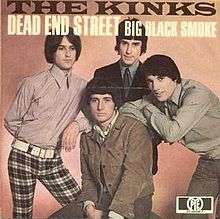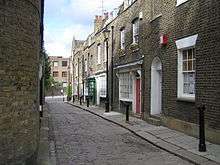Dead End Street (song)
| "Dead End Street" | ||||
|---|---|---|---|---|
 | ||||
| Single by The Kinks | ||||
| B-side | "Big Black Smoke" | |||
| Released | 18 November 1966 (UK) | |||
| Format | 7" single (45 RPM) | |||
| Recorded | 1966 at Pye Studios (No. 2), London | |||
| Genre | Rock | |||
| Label |
Pye 7N 17222 (UK) Reprise 0540 (US) | |||
| Writer(s) | Ray Davies | |||
| Producer(s) | Shel Talmy | |||
| The Kinks singles chronology | ||||
| ||||
"Dead End Street" is a song by the British band The Kinks from 1966, written by main songwriter Ray Davies. Like many other songs written by Davies, it is to some degree influenced by British Music Hall. It was originally released as a non-album single, but has since been included as one of several bonus tracks from the Face to Face CD. The song, like many others by the group, deals with the poverty and misery found in the lower classes of English society. The song was a big success in the UK, reaching #5 on the singles charts, but only reached #73 in the United States.[1] In 1976 it ranked #72 on New Musical Express's list of the Top 100 Singles of All Time.[2] Some labels list the song as "Deadend Street".
'Dead End Street' was the working title for the Electric Light Orchestra's song "Sweet Talkin' Woman", until Jeff Lynne scrapped and rewrote most of the lyrics in its final stages.
Promotional Film
A mimed promotional film (precursor to the modern music video) was produced for the song in late 1966. It was filmed on Little Green Street, a diminutive eighteenth century lane in North London, located off Highgate Road in Kentish Town.

The film was shot in black and white, and featured each member of the band dressed as an undertaker, as well as playing various other characters throughout. With a length of roughly 3:15 in total, it represents one of the first true "music videos". Dave Davies says that the BBC disliked the film, with the group dressed as Victorian pallbearers and one of their roadies in a nightshirt suddenly leaping out of the coffin as they put it down on the pavement, claiming it was in bad taste.[3]
The song was recorded at a time when bassist Pete Quaife had left the band after a car accident, and was replaced by John Dalton. Quaife had returned to the group by the time the promotional film was shot.
Covers and alternative versions
"Dead End Street" has been covered by the Mod revival band The Jam. The song and its music video influenced Oasis's #1 hit "The Importance of Being Idle" from 2005.[4] An unreleased alternative recording of the song from October 1966 was issued in December 2008 on the Kinks 6-CD box set Picture Book. In 2010, Davies also recorded this as a duet with Amy Macdonald on the album See My Friends.
Personnel
- Ray Davies-Lead vocals, guitar
- Dave Davies-Guitar, bass, backing vocals
- John Dalton-Bass, backing vocals
- Mick Avory-drums
- Nicky Hopkins-piano
- It is known that The Kinks had gone to a pub frequented by session musicians whilst recording Dead End Street and got into conversation with a trombonist who they then asked to contribute to the song.
References
- ↑ "U.S. Chart Positions". Kinks.it.rit.edu. Retrieved 2014-06-13.
- ↑ "Rocklist.net NME Greatest Singles Lists". Rocklistmusic.co.uk. Retrieved 2014-06-13.
- ↑ "Dave Davies Returns to Little Green Street and talks about Dead End Street". Youtube.com. Retrieved 2014-06-14.
- ↑ Stephen Thomas Erlewine (2005-05-31). "Don't Believe the Truth – Oasis | Songs, Reviews, Credits, Awards". AllMusic. Retrieved 2014-06-13.